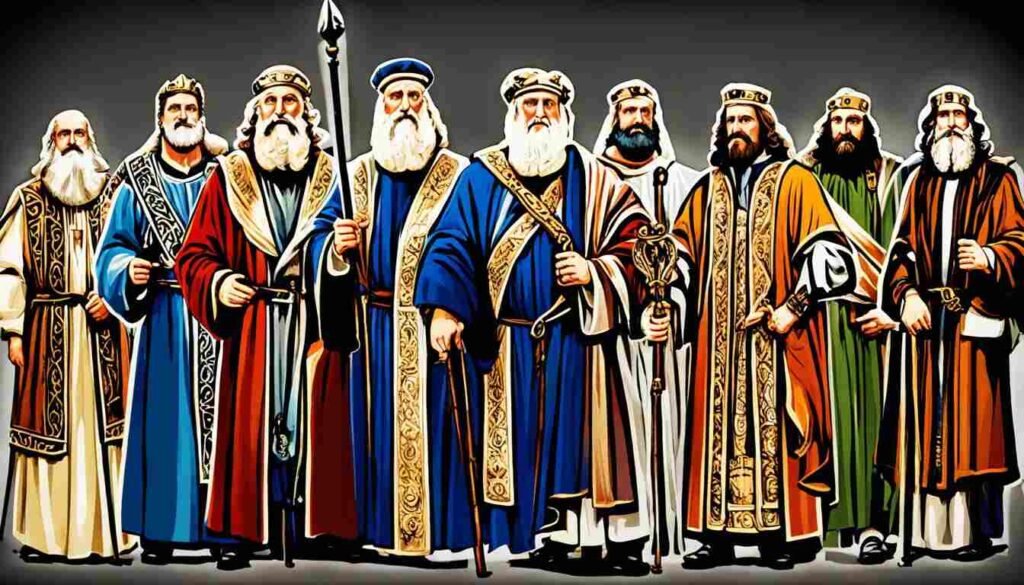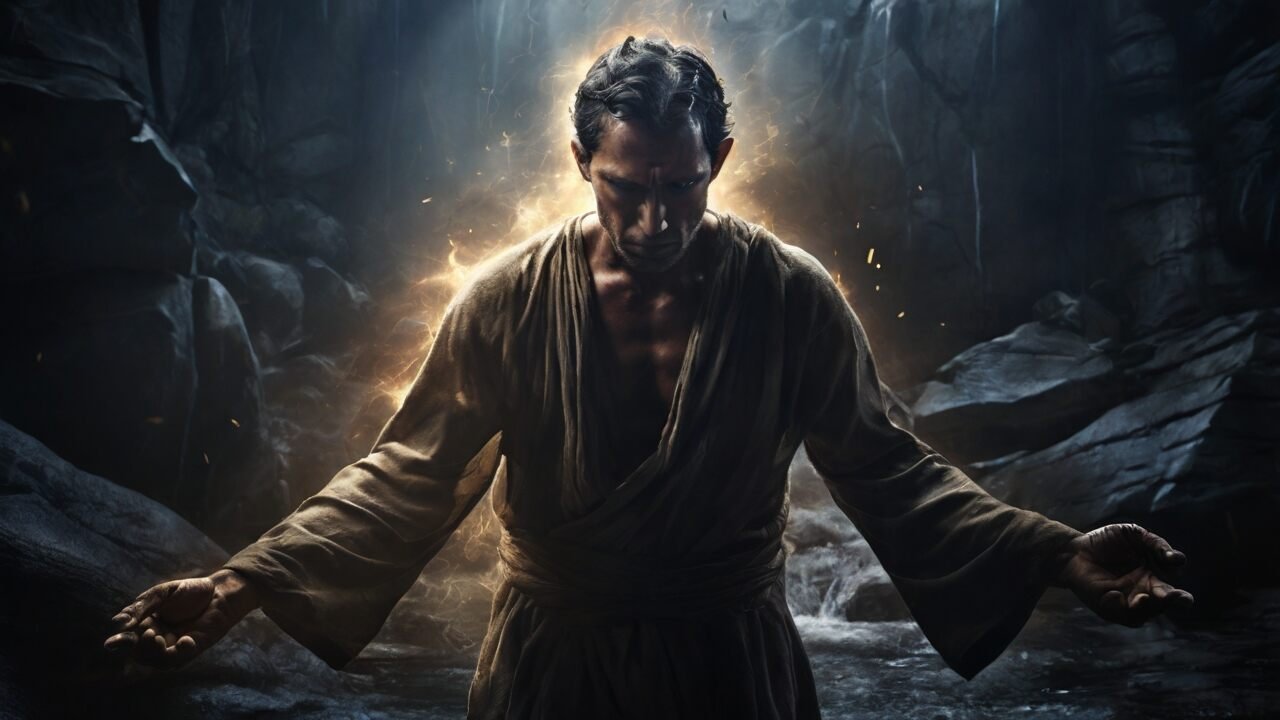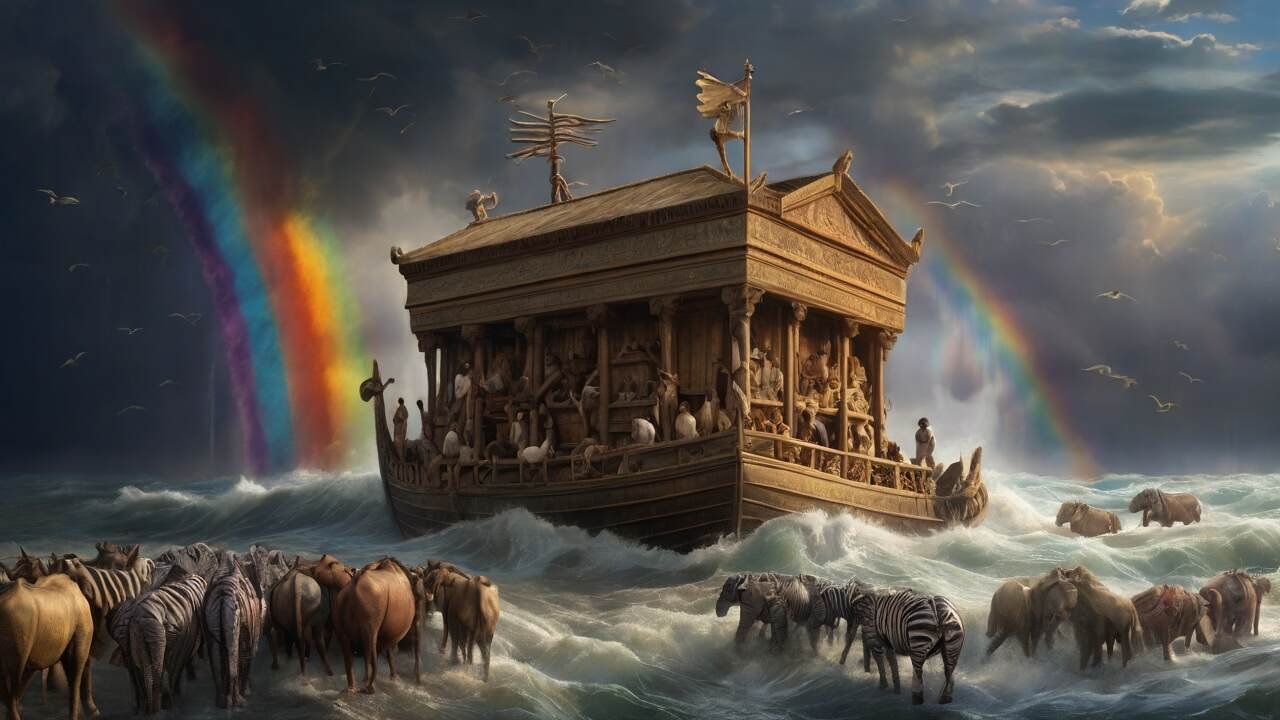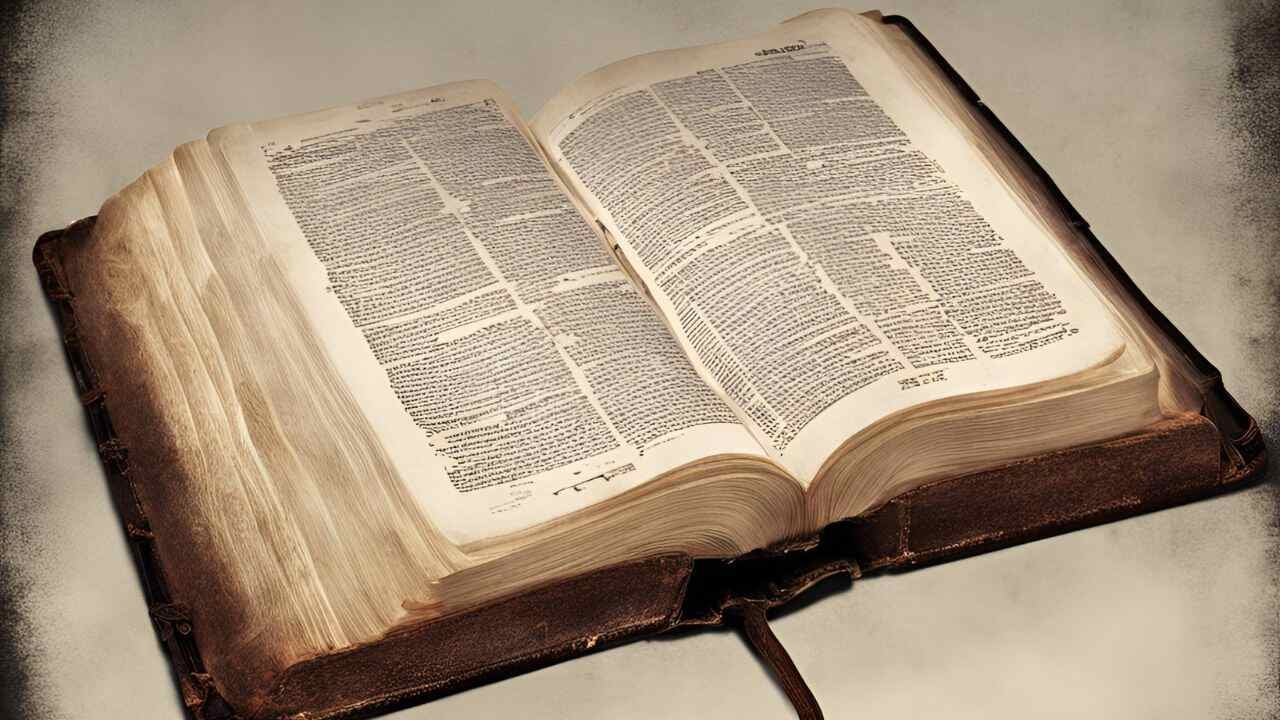The King James Bible is a rich tapestry woven with the stories of pivotal biblical figures known as the patriarchs. These men – Abraham, Isaac, and Jacob – played integral roles in establishing the foundations of the Israelite people and their monotheistic faith. Their narratives, chronicled within the book of Genesis, set the stage for the rest of the biblical narrative, shaping the lives and destinies of generations to come.
As the “Father of Many Nations,” the patriarch Abraham was the first to receive God’s covenant promise of land, descendants, and that all families of the earth would be blessed through him. His son Isaac was the heir to this sacred covenant, while Jacob, also known as Israel, had twelve sons who became the twelve tribes of Israel. These patriarchs and their struggles, triumphs, and divine encounters are central to understanding the origins and significance of the Israelite people.
Key Takeaways
- The three main biblical patriarchs are Abraham, Isaac, and Jacob.
- These men played pivotal roles in establishing the foundations of the Israelite people and their monotheistic religion.
- Abraham was the first patriarch, known as the “Father of Many Nations,” to whom God made a covenant promise.
- Isaac was the son of Abraham and heir to the covenant, while Jacob had 12 sons who became the 12 tribes of Israel.
- The stories of these patriarchs are central to the book of Genesis and set the stage for the rest of the biblical narrative.
The Three Biblical Patriarchs
The three primary patriarchs featured in the King James Bible are Abraham, Isaac, and Jacob. These men are pivotal figures in the book of Genesis, as God establishes His covenant with them and their descendants, the Israelites. Their lives and stories form the foundation for the rest of the biblical narrative.
Abraham, Isaac, and Jacob
Abraham is considered the first patriarch, called by God to leave his homeland and settle in Canaan, where God promises to make him the father of a great nation. His son, Isaac, is the heir to the covenant, while Jacob, also known as Israel, has twelve sons who become the twelve tribes of Israel.
These three biblical figures played a crucial role in shaping the Israelite faith and laying the groundwork for the rest of the Bible. Their stories, filled with trials, triumphs, and encounters with the divine, have captivated readers for centuries and continue to hold deep significance for both Jews and Christians.
Their Significance in Genesis
The book of Genesis, the first book of the Bible, is largely dedicated to the lives and legacies of Abraham, Isaac, and Jacob. It chronicles their journeys, the promises God made to them, and the ways in which their descendants would play a vital role in the unfolding of God’s plan for the world.
From Abraham’s call to leave his home and the covenant God made with him, to Isaac’s inheritance of the promise and Jacob’s struggle to claim his birthright, the narratives of these three patriarchs lay the foundation for the Israelites’ identity and their relationship with the divine.
The lives and stories of Abraham, Isaac, and Jacob continue to captivate readers and hold deep significance for both Jewish and Christian traditions. As the central figures in the book of Genesis, their legacy and influence extend far beyond the pages of the Bible, shaping the faith and identity of the Israelites for generations to come.
Abraham: Father of Many Nations
Abraham, the first and most prominent of the biblical patriarchs, is known as the father of many nations. God’s covenant with Abraham is a pivotal moment in the Genesis narrative, shaping the Israelite people and their relationship with the divine.
God’s Promise to Abraham
In the book of Genesis, God calls Abram (later known as Abraham) to leave his homeland and settle in the land of Canaan, promising to make him the father of a great nation. The Lord declares, “I will make you a great nation, and I will bless you and make your name great, so that you will be a blessing” (Genesis 12:2). This divine covenant is repeated and affirmed throughout Abraham’s life, with God promising that all families of the earth will be blessed through him.
The Binding of Isaac
The most well-known story of Abraham’s life is the Binding of Isaac, where God tests the patriarch’s faith by commanding him to offer his son Isaac as a sacrifice. Abraham’s unwavering obedience to God is on full display as he prepares to carry out the divine instruction, only to be stopped at the last moment by an angel. This pivotal event solidifies Abraham’s legacy as the founding father of the Israelite people, demonstrating his profound trust in the Lord.
Through his covenant with God and his unshakable faith, Abraham is established as the father of many nations, including the Israelites. His life and legacy continue to inspire believers and scholars alike, as the biblical patriarchs’ stories reveal the profound depth of God’s relationship with humanity.
Isaac: Heir to the Covenant
In the biblical narrative, Isaac occupies a crucial role as the heir to the divine covenant established with his father, Abraham. As the second of the three patriarchs, Isaac’s life and legacy are intricately woven into the tapestry of God’s plan for the chosen people.
Isaac’s birth, though miraculous, marked the fulfillment of God’s promise to Abraham and Sarah, who had long struggled with infertility. His arrival signified the continuity of the divine covenant, paving the way for the eventual emergence of the nation of Israel.
One of the most poignant and theologically significant events in Isaac’s life was the “Binding of Isaac,” also known as the Akedah. This dramatic episode, described in Genesis 22, tested Abraham’s faith and obedience, as he was commanded by God to sacrifice his beloved son. Though ultimately spared from death, Isaac’s role in this pivotal moment solidified his status as the designated heir to the covenant.
Throughout his life, Isaac remained a steadfast figure, inheriting the blessings and promises made to his father. He continued the tradition of seeking divine guidance, as evidenced by his prayers for his wife, Rebekah, who struggled with infertility much like his own parents had. The Lord’s intervention, granting Rebekah twin sons, Jacob and Esau, further demonstrates the unfolding of God’s plan for the chosen lineage.
Isaac’s life, marked by both divine favor and personal struggles, serves as a testament to the enduring nature of the covenant established with Abraham. As the middle patriarch, Isaac’s story bridges the gap between the pioneering faith of his father and the transformative journey of his son, Jacob, who would ultimately be renamed Israel and become the progenitor of the twelve tribes.
Through the life of Isaac, we witness the faithfulness of God and the unfolding of His divine purpose, as the covenant is passed down from one generation to the next. Isaac’s role as the heir to the covenant serves as a powerful reminder of the enduring legacy of faith and the centrality of God’s plan in the lives of the patriarchs.
Jacob’s Struggle and Renaming
The biblical patriarch Jacob stands out for his remarkable life journey, marked by both challenges and transformative moments. His story, as recounted in the book of Genesis, offers profound insights into the human experience and the divine plan.
One of the most pivotal events in Jacob’s life was his legendary struggle with a mysterious figure, often interpreted as an angel or manifestation of God. This encounter took place as Jacob was preparing to reunite with his estranged brother, Esau, after years of separation and conflict.
“And Jacob was left alone; and there wrestled a man with him until the breaking of the day.” (Genesis 32:24)
The struggle was intense, and Jacob refused to give up, wrestling through the night. As the sun rose, the divine figure bestowed upon Jacob a new name: “Israel,” meaning “he who struggles with God.” This moment marked a profound spiritual transformation for Jacob, representing his newfound identity and closer relationship with the divine.
The renaming of Jacob to Israel holds deep significance in the biblical narrative. It symbolizes the individual’s capacity for growth, redemption, and the ability to overcome personal struggles through faith and perseverance. Jacob’s new name reflects his resilience and the divine blessing he received, paving the way for him to become the progenitor of the Twelve Tribes of Israel.

Jacob’s story encourages us to embrace our own challenges, recognizing them as opportunities for personal and spiritual transformation. Just as Jacob’s name was changed, we too can undergo a transformative process, emerging stronger and more aligned with the divine plan for our lives.
The Twelve Tribes of Israel
The lives and stories of the biblical patriarchs – Isaac, Jacob, and their ancestors – laid the foundation for the Israelite people and their faith. At the heart of this narrative is the formation of the twelve tribes of Israel, a pivotal moment in the history of the chosen people.
After Jacob, also known as Israel, wrestled with an angel and received his new name, he went on to have twelve sons. These sons became the progenitors of the twelve tribes that would eventually make up the nation of Israel.
- Reuben
- Simeon
- Levi
- Judah
- Issachar
- Zebulun
- Dan
- Naphtali
- Gad
- Asher
- Joseph
- Benjamin
The twelve tribes of Israel were not merely symbolic; they represented the vast and diverse community that would carry forward the covenant established with the biblical patriarchs. Each tribe had its own distinct identity, territory, and role to play in the unfolding of God’s plan for the Israelites.
| Tribe | Significance |
|---|---|
| Reuben | Firstborn son of Jacob, though he lost his birthright due to his actions. |
| Simeon and Levi | Brothers who sought vengeance, leading to their tribes being scattered among the others. |
| Judah | The tribe from which the Messiah would come, and the most prominent of the twelve. |
| Joseph | Favored son of Jacob, whose two sons, Ephraim and Manasseh, became separate tribes. |
| Benjamin | Youngest son of Jacob, and the tribe that would later produce the first king of Israel, Saul. |
The twelve tribes of Israel, rooted in the lives and legacies of the biblical patriarchs, would go on to shape the course of Israelite history, both spiritually and geographically. Their stories continue to captivate and inspire readers of the King James Bible to this day.
“And Jacob called unto his sons, and said, Gather yourselves together, that I may tell you that which shall befall you in the last days.” (Genesis 49:1)
The Testaments of the Twelve Patriarchs
Beyond the pages of the King James Bible, an intriguing apocryphal work known as “The Testaments of the Twelve Patriarchs” offers a unique glimpse into the spiritual legacies of the biblical patriarchs. This text, believed to be the dying commands and prophecies of the twelve sons of Jacob, provides additional insight into the lives and legacies of these foundational figures of Israelite religion and morality.
Ethical Teachings and Prophecies
The Testaments delve deeply into the ethical teachings and prophetic visions of patriarchs such as Reuben, Simeon, Levi, and Judah. These writings not only emphasize the significance of the biblical patriarchs in establishing the moral and spiritual foundations of the Israelite faith, but also shed light on their prophecies and the enduring ethical teachings that have shaped generations of believers.
Though not considered canonical scripture, the Testaments of the Twelve Patriarchs offer a remarkable window into the complex and multifaceted spiritual legacy of the Testaments of the Twelve Patriarchs. By exploring these texts, scholars and believers alike can gain a deeper appreciation for the profound impact these biblical figures had on the development of Judeo-Christian tradition.
FAQ
Who are the main biblical patriarchs mentioned in the King James Bible?
The three main biblical patriarchs mentioned in the King James Bible are Abraham, Isaac, and Jacob. These men played pivotal roles in establishing the foundations of the Israelite people and their monotheistic religion.
What were the roles of these patriarchs in the Bible?
Abraham was the first patriarch, known as the “Father of Many Nations”, to whom God made a covenant promise of land, descendants, and that all families of the earth would be blessed through him. Isaac was the son of Abraham and heir to the covenant, while Jacob, also known as Israel, had 12 sons who became the 12 tribes of Israel. These patriarchs and their stories are central to the book of Genesis and set the stage for the rest of the biblical narrative.
What is the significance of Abraham in the Bible?
Abraham is the first and most prominent of the three biblical patriarchs. God calls Abraham, originally named Abram, to leave his homeland and settle in the land of Canaan, promising to make him the father of a great nation and that all families of the earth will be blessed through him. Abraham’s unwavering faith and obedience to God are central to his legacy as the founding patriarch of the Israelite people.
What was the role of Isaac in the biblical narrative?
Isaac, the son of Abraham and Sarah, is the second patriarch and heir to God’s covenant promise. Though initially unable to have children, Isaac’s wife Rebekah miraculously gives birth to twins, Esau and Jacob. Jacob, through trickery, receives his father’s blessing and the covenant promises, becoming the third patriarch.
How did Jacob become the third patriarch?
Jacob is later renamed “Israel” after wrestling with an angel, and has 12 sons who become the 12 tribes of Israel. The lives and stories of these patriarchs – Abraham, Isaac, and Jacob – are central to the book of Genesis and lay the foundation for the Israelite people and their religion.
What is the Testaments of the Twelve Patriarchs?
The Testaments of the Twelve Patriarchs is an apocryphal work believed to be the dying commands and prophecies of the twelve sons of Jacob. While not considered canonical scripture, this text provides additional insight into the lives and legacies of the biblical patriarchs, offering a unique window into the spiritual legacy of these founding figures.








